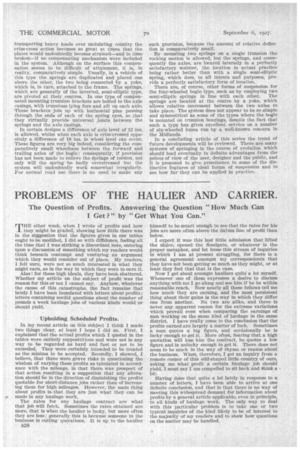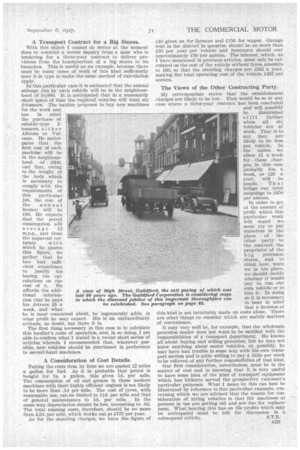PROBLEMS OF THE HAULIER AND CARRIER.
Page 46

Page 47

If you've noticed an error in this article please click here to report it so we can fix it.
The Question of Profits. Answering the Question "How Much Can I Get ? " by "Get What You Can."
THE other week, when I wrote of profits and how they might be graded, showing how little there was in the suggestion that the figures given in our tables ought to be modified, I did so with diffidence, feeling all the time that I was striking a discordant note, entering upon a discussion of Something which my readers would think beneath contempt and venturing an argument which they would consider out of place. My readers, I felt sure, were not so much interested in what they might earn, as in the way in which they were to earn it.
Alas! for these' high ideals, they, have been shattered. Whether my article on the subject of profit' was the reason for this or not I cannot say. Anyhow, whatever the cause of this, catastrophe, the fact remains that lately I have been inundated with letters about profits; letters containing sordid questions about the number of pounds a week haulage jobs of various kinds would or should yield.
Upholding Scheduled Profits.
In my recent article on this subject I think I made two things clear, at least I hope I did so. First, explained that the actual profits which I quoted in the tables were entirely supposititious and were not in any way to be regarded as hard and fast or not to be exceeded. They were certainly intended to be treated as the minima to be accepted. Secondly, I showed, I believe, that there were grave risks in questioning the wisdom of varying these profits as tabulated in accordance with the mileage, in that there was prospect of that action resulting in a suggestion that any alteration should lie in the direction of diminishing the profits quotable for short-distance jobs rather than of increasing them for high mileages. However, the main thing about profits is that they are just what they can be made in any haulage work.
The rates for any haulage contract are what that job will fetch. Sometimes the rates obtained are more, that is when the haulier is lucky, but more often they are less ; generally this is because someone in the business is cutting quotations. It is up to the haulier B28 himself to be smart enough to see that the rates for his jobs are more often above the datum line of profit than below.
I expect it was this last little admission that lifted the sluice, opened the floodgate, or whatever is the proper metaphor, and let loose this stream of inquiries in which I am at present struggling, for there is a general agreement amongst my correspondents that they have not been getting so much as they might, or at least they feel that that is the case.
Now I get about amongst hauliers quite a lot myself. Whenever one of them expresses a desire to discuss anything with me I go along and see him if he be within reasonable reach. Now nearly all these fellows tell me how much they are earning, and the most persistent thing about their gains is the way in which they differ one from another. No two are alike, and there is never any apparent reason for the extreme variations which prevail even when comparing the earnings of men working on the same kind of haulage in the same district. I have really come to the conclusion that the profits earned are largely a matter of luck. Sometimes a man quotes a big figure, and occasionally he is lucky enough to get it. More often, fearing that a high quotation will lose him the contract, he quotes a low figure and is unlucky enough to get it. There does not seem to be much in the way of rhyme or reason about the business. When, therefore, I get an inquiry from a remote corner of this odd-shaped little country of ours, asking me what profit a certain haulage job should yield, I must say I am compelled to sit back and think a bit.
Having done that quite a lot lately in response to a number of letters, I have been able to arrive at one definite conclusion, and that is that there is no way of meeting this widespread demand for information about profits by a general article applicable, even in principle, to all kinds of haulage work. The only way to deal with this particular problem is to take one or two typical inquiries of the kind likely to be of interest to the majority of my readers and to show how questions on the matter may be handled.
A Transport Contract for a Big Stores.
With this object I cannot do better at the moment than to consider a recent inquiry from a man who is tendering for a three-year contract to deliver provisions from the headquarters of a big stores to its branches. This is useful as an example, because there must be many cases of work of this kind sufficiently near it in type to make the same method of calculation apply.
In this particular case it is estimated that the annual mileage run by each vehicle will be hi the neighbourhood of 10,000. It is anticipated that in a reasonably short space of time the required vehicles will total six 2-tonners. The haulier proposes to buy new machines for the work and has in mind the purchase of subsidy-type 2tonners, either Albions or Vu!cans. He anticipates that . the first cost of each machine will be in the neighbourhood of £600, -and that, owing to the weight of the body which is necessary to comply with the requirements of this particular job, the cost of
the annual licence will be £40. He expects that the petrol consumption will average 12 in.p.g., and from the apparent cer tainty wit h which he quotes this figure, we gather that he has had sufficient experience to justify his basing his 'calculations on the cost of it. He affords the additional information that he pays his drivers £3 a week, and what he is most concerned about, he ingenuously adds, is what profit he may expect. His is an extraordinary attitude, no doubt, but there it is.
The first thing necessary in this case is to calculate this haulier's costs of operation, and, in so doing, I am able to confirm what I stated in a recent short series of articles wherein I recommended that, wherever pos.sible, new vehicles should be purchased in preference to second-hand machines.
A Consideration of Cost Details.
Taking the costs item by item we are quoted 12 miles a gallon for fuel. As it is probable that petrol is bought for Tie, a gallon, this gives id. per mile. The consumption of oil and grease in these modern machines with their highly efficient engines is not likely to be more than id per mile. The cost of .tyres, with reasonable use, can be limited to 11d. per mile and that of general maintenance to 1(1. per mile. In the same way depreciation should be low, amounting to .6d. The total running costs, therefore, should be no more than 4.2d. per mile, which works out at £175 per year.
As for the standing charges, we have the figure of 140 given us. for licences and 1156 for wages. Garage rent in the district in question should be no more than £20 per year per vehicle and insurance should cost approximately £16 per annum. The interest, which, as I have mentioned in previous articles, must only be calculated on the cost of the vehicle without tyres, amounts to £30, so that the standing charges are £262 a year, making thd total operating cost of the vehicle £432 per annum.
The Views of the Other Contracting Party.
My correspondent states that the establishment charges are likely to be low. They would be so in any case where a three-year contract has been concluded and will possibly be diminished still further when all six Vehicles are at work. That is to say they are likely to be less per vehicle. In the tables we allow £1 a week for these charges, in this case probably 10s. a week, or £26 year, will be ample. That brings our total outgoings to £45S per annum. In order to get at the amount of profit which this particular work will stand we must try to put ourselves in the place of the other party to 'the contract, the proprietor of the
b g provision stores, and to think how, were we in his place, we should decide Whether it would pay to run our own vehicle or to hire it. In doing so it is necessary to bear in mind that a decision of this kind is not invariably made on costs alone. There are other things to consider Which are mainly matters of convenience.
It may very well be, for example, that the wholesale provision dealer does not want to be saddled with the ' responsibilities of a transport department. He knows all about buying and selling groceries, but he may not know anything about motor vehicles, or, possibly, he may have had trouble in some way with his own transport section and is quite willing to pay a little per week to be relieved of any further responsibilies of that kind.
Our first consideration, nevertheless, must be in the
matter of cost and in knowing that it is very useful to have some idea of the kind of transport equipment which has hitherto served the prospective customer's particular purposes. What I mean by this can best be illustrated by reference to this particular example, concerning which we are advised that the reason for -con
'sideration of hiring vehicles is that the machines at present in use are getting old and are due for replacement. What bearing this has On tfie profits which may be anticipated must be left for discussion in a subsequent article. " &Tit.




































































































